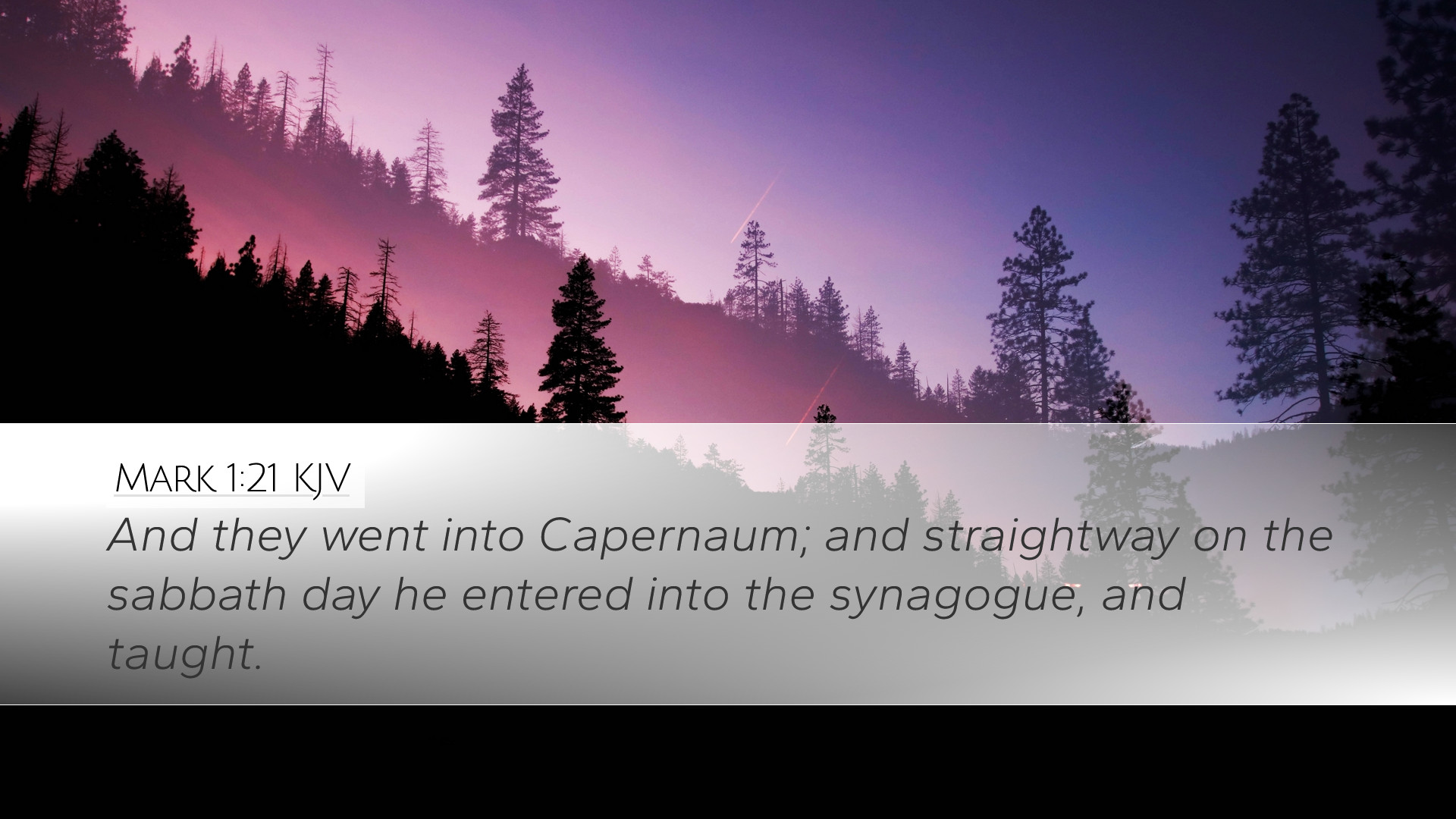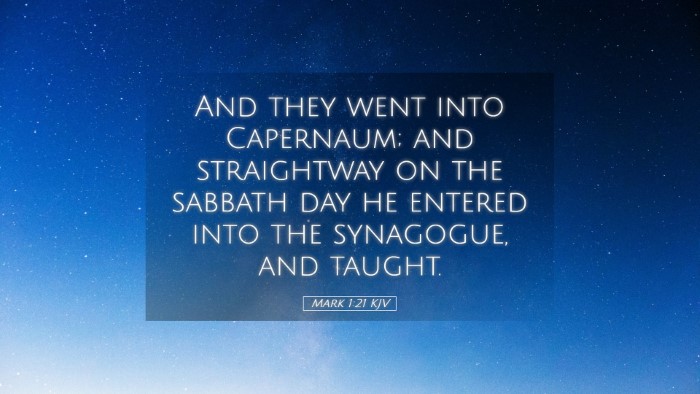Commentary on Mark 1:21
Verse: "And they went into Capernaum; and straightway on the sabbath day he entered into the synagogue, and taught."
Contextual Analysis
The Gospel of Mark is foundational in its portrayal of Christ's early ministry. Mark's account is concise but rich in the portrayal of Jesus' authority and teaching method, which is central to understanding His mission. The setting in Capernaum, a city on the northern shores of the Sea of Galilee, indicates the geographical area where Jesus performed many miracles and teachings.
According to Matthew Henry, Capernaum was an important city that became a hub for Jesus' ministry. The choice of Capernaum as a setting for his teachings shows a strategic choice to reach a diverse audience. The use of the Sabbath day to gather in the synagogue aligns with Jewish customs and illustrates the significance of teaching during a time when the community was gathered for worship.
The Authority of Jesus' Teaching
Matthew Henry notes the immediacy of Christ’s actions—"straightway"—implying a sense of urgency and purpose in His ministry. This contrasts sharply with the religious leaders of the day who had often strayed from the original intent of God’s law. Jesus steps into the synagogue not merely as a visitor but as one who possesses divine authority to teach. The atmosphere is charged with expectancy as the congregation gathers to hear His words.
Albert Barnes emphasizes the unique nature of Jesus' teaching, which was unlike that of the scribes. Scribes taught based on a tradition of rabbinic authority, often quoting other authorities to establish their points. In contrast, Jesus spoke with inherent authority, and His teachings originated from God Himself. This distinction is critical to understanding the impact of Jesus’ ministry on those who heard Him.
Implications for the Sabbath
The fact that Jesus taught on the Sabbath day carries significant implications. The Sabbath was a day of rest and worship as instituted in the Old Testament. According to Adam Clarke, Jesus’ decision to teach on this day reaffirms the Sabbath's role as a day dedicated to God and His word. He challenges the conventional views that had developed around the Sabbath, highlighting that its purpose was to edify rather than restrict.
This encounter implies a deeper spiritual truth—that Jesus is Lord of the Sabbath (cf. Mark 2:28). His engagement with the people transcended mere tradition and entered the realm of spiritual renewal. As pastors and theologians reflect on this, they must consider how the day of worship can foster deeper understanding and connection to God through His Word.
Impact on the Congregation
The immediate impact of Jesus’ teaching was profound. The awe and amazement experienced by the congregation is noted in subsequent verses. Matthew Henry suggests that the people were astonished at His doctrine because He taught with power and authority, not as the religious leaders. This reaction is pivotal as it sets the stage for further development in Christ’s ministry.
As Albert Barnes points out, the astonishment and respect that Jesus commanded played a crucial role in His ability to influence and transform lives. This speaks volumes about the effectiveness of authoritative teaching and the importance of spiritual integrity in ministry. The engagement of the teacher with the audience led to a transformative experience, one that should challenge modern-day ministers to pursue authentic and spirit-led teaching methods.
Lessons for Modern Believers
The verse presents key lessons for pastors, students, and scholars:
- The Importance of Location: Jesus’ choice of Capernaum serves as a reminder of the importance of strategic locations for ministry. Areas with high population density may require more focused outreach efforts.
- Teaching with Authority: Teachers of the Word must convey the scriptures with the authority that comes from being aligned with God’s purposes. Authenticity and sincerity in delivery foster an environment of respect and receptivity.
- Utilization of Sacred Time: The Sabbath is not only to be kept as a day of rest but also as a time for spiritual engagement. Modern congregations should prioritize teaching and learning about God during worship services.
- Spiritual Renewal: Just as Jesus offered healing and teaching, so too must modern ministries focus on holistic approaches that nurture body and spirit, promoting renewal through the gospel.
Conclusion
Mark 1:21 stands as a pivotal moment in the beginning of Jesus’ public ministry. Through His authoritative teaching in Capernaum, Jesus sets a precedent for how faithful ministry should be conducted. The insights drawn from the commentaries of Henry, Barnes, and Clarke emphasize the vital connection between teaching, authority, and community engagement. For modern believers, there is a call to embrace the transformative power of Jesus’ teaching and embody the principles of His ministry in today’s church.


